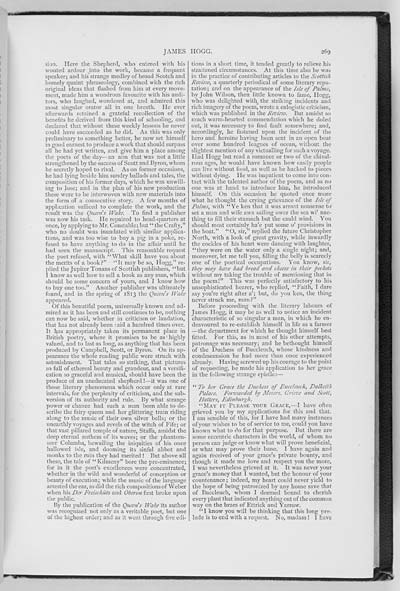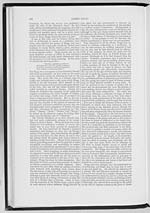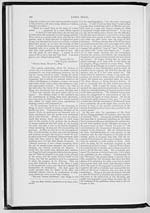269
sion. Here the Shepherd, who entered with his
wonted ardour into the work, became a frequent
speaker; and his strange medley of broad Scotch and
homely quaint phraseology, combined with the rich
original ideas that flashed from him at every move-
ment, made him a wondrous favourite with his audi-
tors, who laughed, wondered at, and admired this
most singular orator all in one breath. He ever
afterwards retained a grateful recollection of the
benefits he derived from this kind of schooling, and
declared that without these weekly lessons he never
could have succeeded as he did. As this was only
preliminary to something better, he now set himself
in good earnest to produce a work that should surpass
all he had yet written, and give him a place among
the poets of the day�an aim that was not a little
strengthened by the success of Scott and Byron, whom
he secretly hoped to rival. As on former occasions,
he had lying beside him sundry ballads and tales, the
composition of his former days, which he was unwill-
ing to lose; and in the plan of his new production
these were to be interwoven with new materials into
the form of a consecutive story. A few months of
application sufficed to complete the work, and the
result was the Queen's Wake. To find a publisher
was now his task. He repaired to head-quarters at
once, by applying to Mr. Constable; but "the Crafty,"
who no doubt was inundated with similar applica-
tions, and was too wise to buy a pig in a poke, re-
fused to have anything to do in the affair until he
had seen the manuscript. This reasonable request
the poet refused, with "What skill have you about
the merits of a book?" "It may be so, Hogg," re-
plied the Jupiter Tonans of Scottish publishers, "but
I know as well how to sell a book as any man, which
should be some concern of yours, and I know how
to buy one too." Another publisher was ultimately
found, and in the spring of 1813 the Queen's Wake
appeared.
Of this beautiful poem, universally known and ad-
mired as it has been and still continues to be, nothing
can now be said, whether in criticism or laudation,
that has not already been said a hundred times over.
It has appropriately taken its permanent place in
British poetry, where it promises to be as highly
valued, and to last as long, as anything that has been
produced by Campbell, Scott, or Byron. On its ap-
pearance the whole reading public were struck with
astonishment. That tales so striking, that pictures
so full of ethereal beauty and grandeur, and a versifi-
cation so graceful and musical, should have been the
produce of an uneducated shepherd!�it was one of
those literary phenomena which occur only at rare
intervals, for the perplexity of criticism, and the sub-
version of its authority and rule. By what strange
power or chance had such a man been able to de-
scribe the fairy queen and her glittering train riding
along to the music of their own silver bells; or the
unearthly voyages and revels of the witch of Fife; or
that vast pillared temple of nature, Staffa, amidst the
deep eternal anthem of its waves; or the phantom-
seer Columba, bewailing the iniquities of his once
hallowed isle, and dooming its sinful abbot and
monks to the ruin they had merited! But above all
these, the tale of "Kilmeny" bore the pre-eminence;
for in it the poet's excellences were concentrated,
whether in the wild and wonderful of conception or
beauty of execution; while the music of the language
arrested the ear, as did the rich compositions of Weber
when his Der Freisch�utz and Oberon first broke upon
the public.
By the publication of the Queen's Wake its author
was recognized not only as a veritable poet, but one
of the highest order; and as it went through five edi-
tions in a short time, it tended greatly to relieve his
straitened circumstances. At this time also he was
in the practice of contributing articles to the Scottish
Review, a quarterly periodical of some literary repu-
tation; and on the appearance of the Isle of Palms,
by John Wilson, then little known to fame, Hogg,
who was delighted with the striking incidents and
rich imagery of the poem, wrote a eulogistic criticism,
which was published in the Review. But amidst so
much warm-hearted commendation which he doled
out, it was necessary to find fault somewhere; and,
accordingly, he fastened upon the incident of the
hero and heroine having been sent in an open boat
over some hundred leagues of ocean, without the
slightest mention of any victualling for such a voyage.
Had Hogg but read a romance or two of the chival-
rous ages, he would have known how easily people
can live without food, as well as be hacked to pieces
without dying. He was impatient to come into con-
tact with the talented author of the poem, and as no
one was at hand to introduce him, he introduced
himself. On this occasion he quoted once more
what he thought the crying grievance of the Isle of
Palms, with "Ye ken that it was arrant nonsense to
set a man and wife awa sailing ower the sea wi' nae-
thing to fill their stamach but the cauld wind. You
should most certainly ha'e put some o' provisions in
the boat." "O, sir," replied the future Christopher
North, with a look of great gravity, while inwardly
the cockles of his heart were dancing with laughter,
"they were on the water only a single night; and,
moreover, let me tell you, filling the belly is scarcely
one of the poetical occupations. You know, sir,
they may have had bread and cheese in their pockets
without my taking the trouble of mentioning that in
the poem!" This was perfectly satisfactory to his
unsophisticated hearer, who replied, "Faith, I dare
say you're right after a'; but, do you ken, the thing
never struck me, man?"
Before proceeding with the literary labours of
James Hogg, it may be as well to notice an incident
characteristic of so singular a man, in which he en-
deavoured to re-establish himself in life as a farmer
�the department for which he thought himself best
fitted. For this, as in most of his other attempts,
patronage was necessary; and he bethought himself
of the Duchess of Buccleuch, whose kindness and
condescension he had more than once experienced
already. Having screwed up his courage to the point
of requesting, he made his application to her grace
in the following strange epistle:�
" To her Grace the Duchess of Buccleuch, Dalkeith
Palace. Forwarded by Messrs. Grieve and Scott,
Hatters, Edinburgh.
"MAY IT PLEASE YOUR GRACE,�I have often
grieved you by my applications for this and that.
I am sensible of this, for I have had many instances
of your wishes to be of service to me, could you have
known what to do for that purpose. But there are
some eccentric characters in the world, of whom no
person can judge or know what will prove beneficial,
or what may prove their bane. I have again and
again received of your grace's private bounty, and
though it made me love and respect you the more,
I was nevertheless grieved at it. It was never your
grace's money that I wanted, but the honour of your
countenance; indeed, my heart could never yield to
the hope of being patronized by any house save that
of Buccleuch, whom I deemed bound to cherish
every plant that indicated anything out of the common
way on the braes of Ettrick and Yarrow.
"I know you will be thinking that this long pre-
lude is to end with a request. No, madam! I have

![]() Universal Viewer |
Universal Viewer | ![]() Mirador |
Large image | Transcription
Mirador |
Large image | Transcription
![]()

